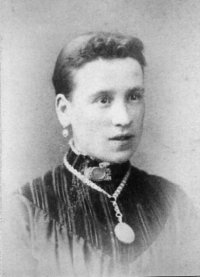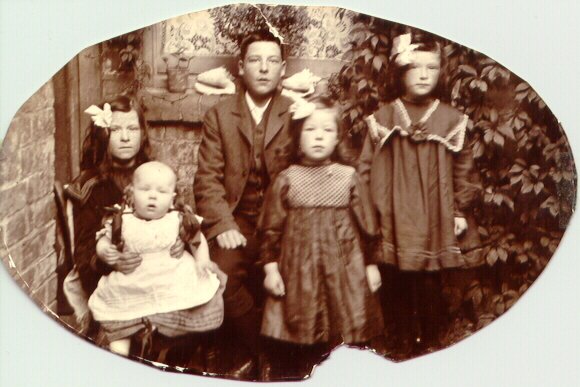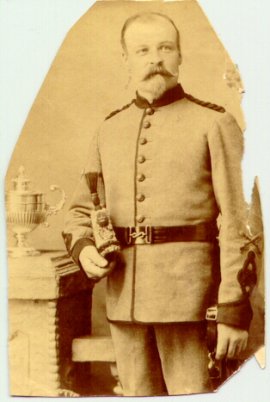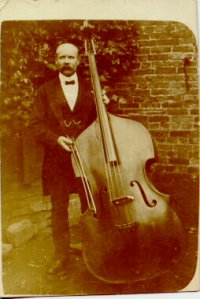

George Edwin Saull 1863 - 1948
A Biography written by his Granddaughter Annette Miller

This article was originally published in the April 2001 edition of Soul Search, the journal of The Sole Society.
George Edwin Saull died in March 1948 at the age of 85. He was a man who packed his life with a wealth of widely assorted activities.
At the age of seven or eight he began work in the Northampton boot and shoe industry. He was born in Northampton on the 6th of July 1863. He remembered in his later years when Northampton Cobblers, as a mark of their craft, wore top hats and white aprons on Sundays.
In 1880, at the age of seventeen, he joined the army with The Northamptonshire Regiment and soon afterwards went to China. He was a first class shot. After about five years he bought his discharge and stayed in China helping with the American Missionary Society for a number of years.
 Just before the turn of the century he
returned to England. He married Harriet Gutteridge on the 12th of
March 1889 at the College Street Chapel, a Baptist place of worship well known
in Northampton.. They had five children, all born in Northampton. Their first
born was a son named George Vincent, born 27th December 1890. The name Vincent
was given in honour of George Saull's eldest stepbrother who had emigrated to
Philadelphia, USA many years before. Their second child was a daughter named
Elsie Olivette born 6th May 1893. Their third child, also a daughter,
named Annie Mabel born 27th August 1897. The Fourth child, a girl
named Eva Nellie born September 27th, 1899. The couple's last child was a son
named Percy born February 4th, 1904.
Just before the turn of the century he
returned to England. He married Harriet Gutteridge on the 12th of
March 1889 at the College Street Chapel, a Baptist place of worship well known
in Northampton.. They had five children, all born in Northampton. Their first
born was a son named George Vincent, born 27th December 1890. The name Vincent
was given in honour of George Saull's eldest stepbrother who had emigrated to
Philadelphia, USA many years before. Their second child was a daughter named
Elsie Olivette born 6th May 1893. Their third child, also a daughter,
named Annie Mabel born 27th August 1897. The Fourth child, a girl
named Eva Nellie born September 27th, 1899. The couple's last child was a son
named Percy born February 4th, 1904.

George and Harriet's children: Back row from left to right: Elsie Olivette, George Vincent, Annie Mabel.
Front row from left to right: Baby Percy and Eva Nellie
For a time George Saull was a warder at Dartmoor Prison. My late Mother Elsie Olivette told me how she remembered in those days' that prisoners were all chained together when they went out of the gaol on their work in the quarry. She told me that she and her brother often went through the main gates. They were allowed at times to attend the prison church, but only in the gallery. One incident that stood out in her memory occurred during a blizzard when their windows blew out. While a prisoner was putting in new glass her Mother was cooking some bloaters. He said "Gaud mum, what a lovely smell." He had his bloater, but he had to eat it best way he could without being detected while she kept watch on the guard who was pacing up and down on the verandah." The prisoner said to her Mother "Mum you are an angel." Which proved to my Mother Elsie who was then a very little girl that even the toughest prisoners appreciated a touch of human kindness, for in those days' life in Dartmoor Prison was really rough.
What follows is an excerpt from letter dated September 15, 1970 from G.E. Saull's youngest son Percy.
"As far as I can make out my Father was born about 1863 and after a short time at shoemaking he enlisted in the Army at the ripe old age of seventeen. Firstly he was sent to Ireland then in about 1884 sent to South Africa where we were having trouble with the Boers. During the next year, 1885, General Gordon was besieged in Khartoum in the Sudan by the natives under the leadership of the so-called "Mad Mullah." I mention this because just as this was happening, a small detachment from my Fathers regiment The Northants was sent on a sea voyage from South Africa. All on board thought they were going to help in relieving Gordon in the Sudan, until sealed orders they were carrying were opened as they neared Mombassa. These orders directed the ship to make for China and General Gordon was left to his fate. Very soon after he was murdered by the natives, on January 26, 1885. So Dad landed in China in 1885. It must have been about this time he joined the military band and became a bass player. I guess he did his missionary work whilst still serving in the Army but eventually the Missionary Society purchased his discharge and he worked for them full time. I don't know which Society it was except that the Duchess of Rutland was a Patroness at the time. He could certainly speak Chinese well. That is Mandarin Chinese and I can only conclude that he acquired his fluency by actually being amongst and talking to the natives, rather than by textbook studies. Why he left China so early I do not know. Maybe like myself in India he got terribly homesick. He must have been back in this country by 1889 and married my Mother very soon afterwards. I can remember many odd tales he told me of the things that happened to him during those times."

George Edwin Saull, Northamptonshire Regiment displaying trophy for being a Good Shot
Another letter from Percy Saull Dated March 1983 reveals:
"The Regiment my Father was in was the Northamptonshire Regiment, The First Battalion. He married my Mother Harriet Gutteridge about 1889 at the College Street Chapel, a Baptist place of Worship."
During the First World War my Grandfather was a warder at the old Northampton Goal on the Mounts giving up his boot work. He was on duty the night before the last hanging took place at the goal in 1914. After The First World War he went into business for himself making surgical boots for orthopaedic patients. He retired about 1938.
The main work of his life began in 1903 and took up his spare time for about 12 years. Always a keen and talented musician, he built his own organ, no mere harmonium, but an organ with pipes. He bought the material for it as cheaply as possible. What he could not buy he made. His youngest son, Percy Saull can remember his father fashioning keys for the organ from pieces of bone. In all it cost him £15.
His pipe organ was sold just before he died. It was in need of a certain amount of repair. His health was failing and prevented him from carrying out the repairs. The organ was purchased by W. Pearce and Co. Northampton. The organ has two manuals and eight stops and the bellows were operated by foot pedals. It was fully 10 feet high.
I remember the organ taking up the whole upstairs bedroom. There were only two bedrooms! There was a big wooden bench on which to sit. Nothing else was in there, just plain wooden floors and whitewashed walls. I was so pleased when he allowed to me to go upstairs to try and play it. As I was very small, the organ seemed enormous to me with Pipes hitting the ceiling. My cousin Sydney, fifteen years my senior and being a talented musician spent hours playing the organ. My Grandfather's favourite composer was Handel. The neighbours living near 27 Dover Street must have heard it quite plainly as it had a very mellow but loud sound.
George Edwin Saull loved music. He played a string bass in several orchestras in Northampton; The St. Cecilia and Mount Pleasant Orchestras and in the orchestra at the Repertory Theatre when it was the Opera House.
My cousin Madge Saull Bashford of Birmingham told me that our Grandfather served as a Colporteur for the American Bible Society during his time in China. Colporteur translates to "A peddler of devotional literature." His work was to prepare the way for other missionaries. He first had to seek out the Mandarin of the Village (a member of any of the nine ranks of high public officials of the Empire in Imperial China) and ask permission to meet with the people. My Grandfather was required to wear a black hat as a mark of respect.
I remember as a little girl my Grandfather always wore a black crocheted skullcap. When I sat on his knee he would talk to me in Mandarin Chinese, the principal dialect spoken in the area around Peking.

George Edwin Saull
My Grandfather was 72 years old when I was born. I remember him well. He always seemed very ancient to me. He took me for walks on the Northampton Racecourse. On one of our walks he bought me a spinning top and a whip. I remember playing for hours outside his house on Dover Street trying so hard with the whip to keep it going. He always gave me sweets out of a tin he kept in the cupboard by the fireplace. The mantle was covered with a velvet scarf and he had, what seemed to me, hundreds of photographs on it. All the children and Grandchildren were displayed. A gas lamp lighting the living room always fascinated me because I lived in a new modern house with electricity and a telephone! The Grandfather clock was a prominent piece of furniture in his tiny house. He diligently balanced the weights to set the time piece. There was also the famous picture on one of the walls of Grace Darling. She was rowing out in rough seas with her Father, the Lighthouse Keeper on the Farne Islands, to a rock where nine survivors from the wreck of the Forfarshire steamboat had found a foothold. For this she was awarded a gold medal by the Humane Society. This picture kept me spellbound every time I went to his house. That together with his collection of different boot lasts (wooden foot shapes) awaiting leather to be moulded around them are memories that have stayed with me over the years. I remember he always wore a straw boater in the summer. He died at the age of 85 years.
Unfortunately I never met my Grandmother, Harriet Gutteridge Saull, because she died in December 16, 1914. She had complained of stomach pains and was admitted to Northampton General Hospital on a Saturday and she died on Sunday night. The children were all devastated. Percy, the youngest, was only 10 years old! Harriet was only 48 years old.
In those day's it was very difficult for a man to cope with household duties and it was not too long before Granddad married a spinster lady. The children never did take to her as their stepmother. The older ones soon married and young Percy joined the army at a very early age and was sent to India. Percy a talented natural musician, as was his father, played in the military band. He was the regimental bugle boy. Percy died in December 2000 at the age of 97 years. With his passing many stories of another era have gone.
It is with much prodding of family members that these old stories have been told. I have been able to piece a few of the details together and present them here to you. It is so important that we listen to our parents and grandparents and record the many stories we have heard over the years for future generations to enjoy. I know that we sometimes think "Oh no, not that old story again!" It is only through these memorable stories that we can learn of our family's history.
It is always interesting to me how historical events have come into play within our families over time. Today's world events continue to affect many members of our present generation in various ways and will continue to do so, this being one of the more interesting and intriguing segments in the study of Genealogy.
Return to The Sole Society Home Page